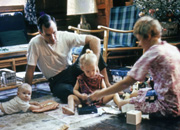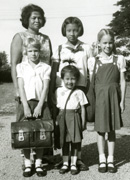FOR IMMEDIATE RELEASE
Friday, September 22, 2006
|
Peace Corps
Contact: Press Office
Phone: 202.692.2230
Fax: 202.692.1379
Email: pressoffice@peacecorps.gov |
In celebration of the 45th anniversary, this is the fifth in a series featuring Peace Corps legacy families.
WASHINGTON, D.C. – Scott Duncan plays down the joke because he’s heard it so many times in his long association with the Peace Corps, but he can still get a laugh out of it: “You’ve heard the joke about the pessimist who always sees the glass half empty, the optimist who sees it half full and the Peace Corps volunteer who says, ‘I could take a bath with that’.”
For those who have taken the 27-month life-changing expedition of becoming a volunteer, stereotypical Peace Corps jokes like these – of being resourceful and frugal – are often told with a sense of pride. For Scott and the Duncan family, it is also a joke the entire family gets.
 Scott, Judith, and their daughter Lesley Duncan all share the Peace Corps experience, spanning two generations and compiling more than 15 years of service between them. “It is almost always a deeply formative influence that changes one in very profound ways,” Scott said, from world view to confidence and humility. Scott, Judith, and their daughter Lesley Duncan all share the Peace Corps experience, spanning two generations and compiling more than 15 years of service between them. “It is almost always a deeply formative influence that changes one in very profound ways,” Scott said, from world view to confidence and humility.
In 1963, Scott and Judith went to Thailand as a young married couple, teaching English at the public schools. Judith worked with girls, while Scott taught at the boys’ school. “It was much easier being a couple because of the support we could give each other,” Scott said.
The Duncans lived in a rickety house and while there, Judith became pregnant. Squealing pigs passed by on their way to the market as Judith biked her way to the girls’ school. It wasn’t the most typical setting, but it worked for the family.  Near the end of their service, Lesley, was born in a Thai hospital. She spent her early years in Thailand while her father was an associate Peace Corps director. Near the end of their service, Lesley, was born in a Thai hospital. She spent her early years in Thailand while her father was an associate Peace Corps director.
“There was a huge flood around the day I was born,” Lesley recounted. “My mom had to travel through waist-high water to get to the hospital. I was the first ‘farang’ or western foreigner baby born in the hospital.”
When they had their two children, Lesley and her sister Martha, Scott and Judith were able to devote much of their time to child-rearing. “I can honestly say that it was a very rewarding time in all ways,” Judith said.
That’s not to say the family perfectly blended with Thai culture. As Scott remembered, “The girls were quite blonde as children and with their fair skin the Thais were always scandalized that we walked out in the sun with them.” People would rush up to the girls with umbrellas in hand to shield them from the sun.
Years later in 1987, Lesley answered life’s call when she was sent to Paraguay as a beekeeping volunteer. Although she had planned to go to law school as a pending graduate of American University, a Peace Corps recruiter redirected her path.
Though not a traditional method of global aid, Lesley’s duties were to help farmer cooperatives increase honey production, produce and bottle their honey, market the products, and then sell them. Her role bolstered the economy in her rural community and led her to Sam, a fellow beekeeper and now husband. The addition of Sam to the Duncan family extended the shared experience to four volunteers. With that connection, it was easy for him to fit in with Lesley and her parents.
The Peace Corps link, according to Sam, is “sort of like we’d all gone to the same college, except you get to talk about eating exotic foods like bugs.” He added that being volunteers “provided a degree of mutual respect” between himself and his in-laws.
While one might think the experiences of the two couples from very different generations would be at odds, Lesley considers her and her parents’ service relatively similar. “The adaptation, frustrations, and high points were probably very similar, even separated by 25 years, two continents, two languages, and very different cultures,” she said. For both parties, volunteering in the Peace Corps was a time to think about major life themes such as family, community, and marriage.
“We all come away from Peace Corps with different conclusions, but we’ve packed a lot of life into those two years,” Scott said.
Lesley’s fondest memories are of hanging out with rural Paraguayans. But when she left her site in Paraguay, Lesley never thought that she would once again find herself in the same position as her parents.
Today Lesley is raising her own family in Thailand as an administrative officer for the Peace Corps. Just like the generation before her, she and Sam have two children, 8 and 10, who have spent the last four years abroad. Even at such a young age, Sam said their children want to be volunteers. With a possible third generation in the works, Sam reflected that “maybe there is something to this whole legacy thing.”
The Peace Corps is celebrating a 45-year legacy of service at home and abroad, and a 30-year high for Volunteers in the field. Since 1961, more than 182,000 Volunteers have helped promote a better understanding between Americans and the people of the 138 countries where Volunteers have served. Peace Corps Volunteers must be U.S. citizens and at least 18 years of age. Peace Corps service is a 27-month commitment.
###
|